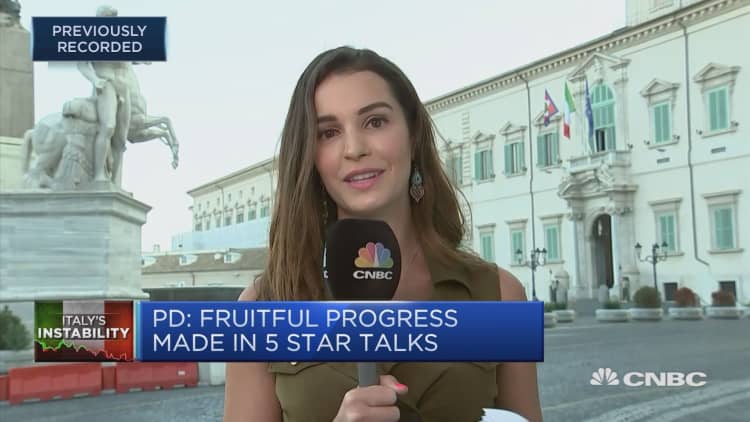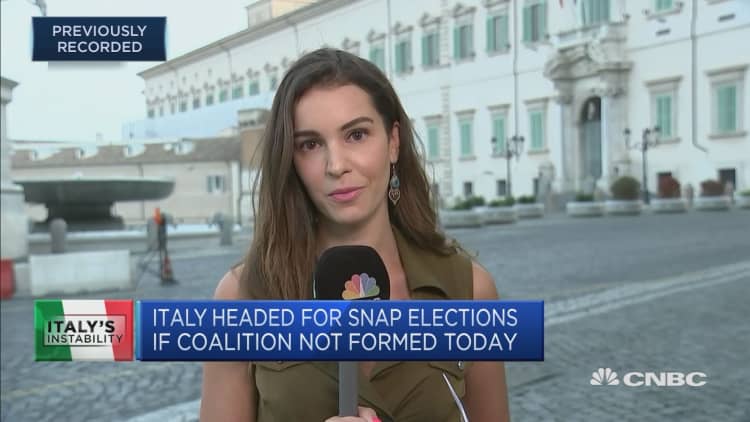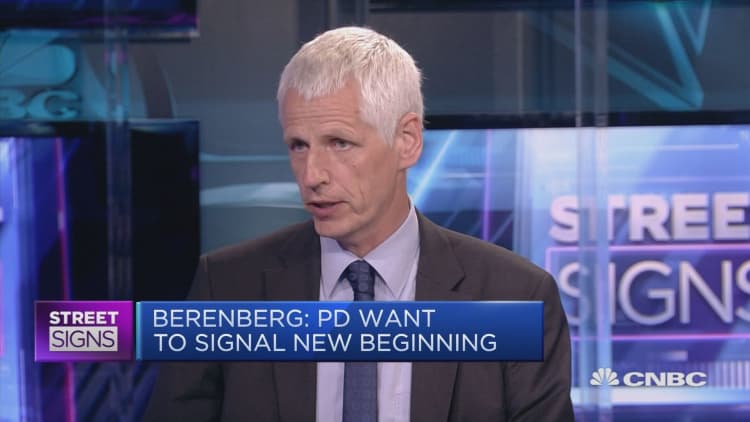
Changing governments is not a new phenomenon in Italy.
The country has seen 66 different governments since World War II, an unfortunate feature that has made it very difficult for any one government to introduce sustained reforms and boost Italy's long-languishing productivity.
However, in the last week investors have cheered the prospect of a new coalition being formed between two parties from the political left: the populist and originally anti-establishment Five-Star Movement (M5S) and the more European-friendly PD (Democratic Party).
Ten-year Italian bond yields have hit fresh three-year lows, breaking through a 200 basis point yield differential to Germany on the anticipation of a more Europhile Italian government as well as another potential round of quantitative easing from the European Central Bank in September, which would also be supportive for bonds.
But M5S leaders and PD have been very critical of each others' policies in the past and make for unlikely bedfellows. So why is this coalition coming together now?
'A government contract'
The last general election in March 2018 saw a surge in popularity for M5S with the party securing 32% of the vote. With no clear winner in the election, it formed a coalition with the right-wing Lega party but its popularity has since plummeted around 17%, according to the latest Politico poll of polls.
A new election would imply a substantial loss of seats for M5S which still wields a lot of influence within parliament. Furthermore, M5S's own party rules dictate that no lawmaker can run twice for a seat (in the spirit of keeping the party structure flat), a prospect that does not appeal to incumbents.
Still many within the party are unhappy that the anti-establishment group will likely partner up with a key established party like PD, though it seems the overall sentiment within M5S remains one of pragmatism.
As M5S lawmaker Cinzia Leone told CNBC: "This potential coalition with PD is precisely not an alliance. It is a government contract that allows us to push forward sensible points for the good of our citizens."

A pro-European agenda
The center-left PD suffered a crushing defeat at the last election, losing seats to both M5S and Lega, which led to the resignation of then leader Matteo Renzi. A new leader, Nicola Zingaretti, was elected earlier this year but it was Renzi, who still has sway within the PD party, who proposed starting a dialogue with M5S after the government collapsed last week.
PD's popularity is back on the rise again — currently polling around 24% from the 19% it secured at the last election.
One of the party's key conditions for entering into a government with M5S as per a document published last week is the "commitment and loyal belonging to the EU for a deeply renewed Europe."
PD lawmaker Massimo Ungaro told CNBC that by entering into government it could "change the narrative" and move toward a friendlier approach to Brussels ahead of key 2020 budget discussions in the fall. "We must regain control of budget discussions which have led Italy down a slippery slope in the last year," he said.

Cabinet positions
While an initial sticking point centered around who would take over as prime minister, Zingaretti confirmed Wednesday that they would not object to Giuseppe Conte, an M5S favorite, being re-appointed.
But this PD concession will inevitably come with a price tag. As a PD lawmaker told CNBC, the PD would in exchange push for influential economic roles such as the Finance Ministry and the Italian commissioner to the EU, a role that is instrumental to keeping the Rome-Brussels dialogue going.
Former Finance Minister Giancarlo Padoan is one of the names being circulated for the finance minister role while PD President and former Prime Minister Paolo Gentiloni another name being discussed for the commissioner role.
If President Sergio Mattarella sees the potential for a stable government, he will give the mandate to Conte to form a government, on which Italy's full parliament can have their say in a vote of confidence in the coming week.
Lurking on the sidelines is former Deputy Prime Minister and leader of Lega Matteo Salvini. He has been reprimanding both former coalition partner M5S as well as PD (Renzi in particular), demanding elections — a decision that can only be taken by Matarella if the M5S-PD talks fail.
While that seems unlikely to happen now, Salvini no doubt has his eyes set on the future. As one of Rome's taxi drivers told me, "Salvini always has something up his sleeve."


